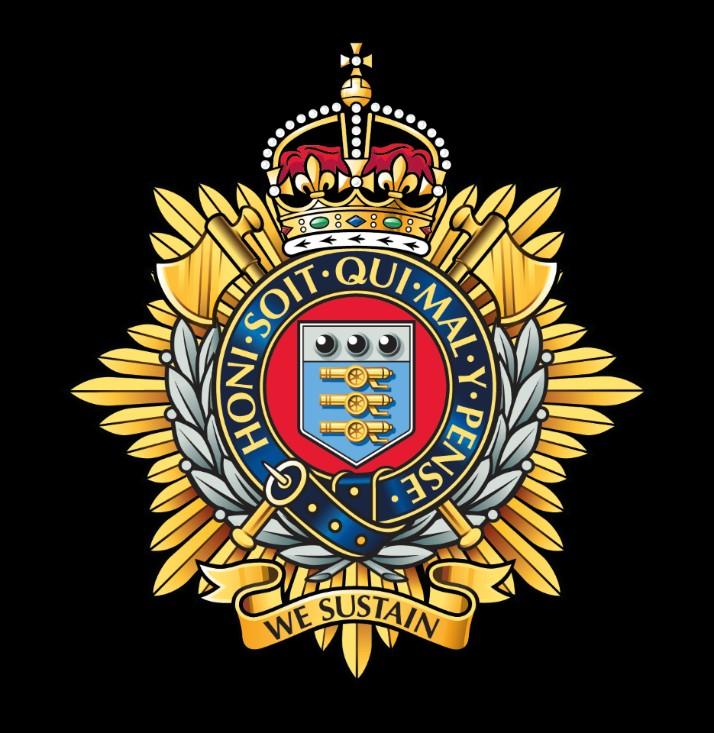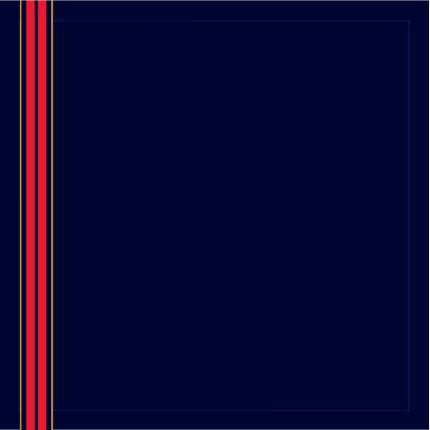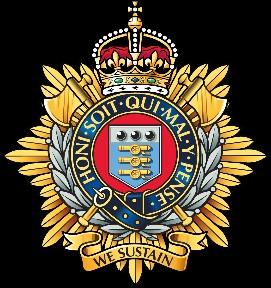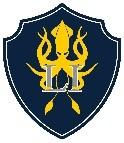


The Royal Logistic Corps Officer Cadet Handbook 2024












The Royal Logistic Corps Officer Cadet Handbook 2024








At brigade level the Royal Logistic Corps second-line functions are delivered through the close support logistic regiment which are responsible for commanding the Brigade Support Group (BSG), holding the brigade’s second-line stocks and resupplying forward from the brigade support group.
The close support logistic regiment is part of the Manoeuvre Brigades order of battle in both peacetime, and on operations. The close support logistic regiment will regularly train together with this brigade and its inventory will be configured to meet the needs for that manoeuvre brigade’s vehicle fleet.
The general support squadron is normally located within the brigade support group and comprises the stores troop, brigade logistic rendezvous troop and a transport troop. Materiel and ammunition natures are delivered to the brigade support group by third-line transport (usually the theatre logistic regiment) and the general support squadron is responsible for the receipt and breaking bulk stocks into unit configured loads. Although the brigade support group must remain sufficiently mobile to keep pace with their brigade, the general support squadron will be less so than the close support squadron due to grounddumped stores.
Close support squadron. Each close support logistic regiment has two close support squadrons whose primary role is the distribution of combat supplies and materiel from the brigade support group to the brigade dependencies at distances up to 50km forward of the brigade support group. A close support squadron comprises a fuel and general transport troop and two combat support troops. The close support squadron’s role requires it to carry out the following activities:
(1) Deliver unit loads to battlegroup and brigade unit echelons.
(2) Operate distribution points.
(3) Deliver general engineer stores, artillery ammunition and bulk fuel.
(4) Hold a mobile reserve of combat supplies on wheels for the brigade.
(5) Configure battlegroup immediate replenishment groups on orders.


Within the divisional area of operations, a theatre logistic regiment will provide coordination of the divisional support group on behalf of the logistic brigade command post. The theatre logistic regiment command post will command the regiment with a focus on divisional sustainment. The headquarters squadron will provide coordination to units within the divisional support group by deconflicting real estate allocation and the coordination of routes within the divisional support area.
Supply squadron. The supply squadron is organised to receive, hold and subsequently issue third-line combat supplies, materiel and equipment to the land component and second-line combat supplies and materiel for divisional troops. It comprises a materiel troop, ammunition troop and divisional logistic rendezvous troop.
Transport squadron. The transport squadron is generated from the theatre logistic regiment’s twinned reserve transport regiment. The squadron’s primary role is to move stocks from the divisional support group through the brigade logistic rendezvous to the brigade support group. Equipped with palletised load system vehicles and long-wheelbase trailers, it can move all classes of materiel (less bulk liquids). It will normally only carry bulk stores but may move engineer stores and artillery natures.
Fuel and general transport squadron. This squadron comprises a bulk fuel installation troop, a bulk liquids transport troop (water and fuel) and a transport troop (for the movement of combat supplies).




Sustainment fusion cell. The sustainment fusion cell is part of the regimental command post. It is responsible for the coordination and tasking of non-military capabilities within the divisional support group but is not responsible for establishing contracts. The cell comprises a local resources section for the local procurement of supplies, services and the coordination of host-nation support and a labour support team responsible for the recruitment and management of locally employed civilians. The labour support team is manned by the regimental command post and augmented by Army reservists from 2 Operational Support Group 10 Queen’s Own Gurkha Logistic Regiment 28 Sqn – Fuel and General Transport
Sqn – Fuel and General Transport
Theatre logistic enabling Regiments are tasked with those activities conducted prior to the arrival of the force’s main body. Where conditions allow, this involves the early deployment of a suitably scaled command and control framework and key enabling forces into a comparatively benign location. Subsequently the sea, air and rail ports of disembarkation, the joint logistic rendezvous and supply area and reception, staging, onward movement and integration facilities will be established and concurrent activity will include the development of operating infrastructure, including the communication and information systems network, and establishing contracts. However, it may be necessary for manoeuvre forces to seize a lodgement in which combat service support elements subsequently establish their facilities. During this initial phase, much of the combat service support resources will be afloat, e.g. hospital ships, or held at a forward mounting base. Following the breakout from the lodgement, more combat service support elements will come ashore.
The theatre enabling group will have the following joint tasks:
(1) Open a new theatre by deploying prior to the main force to set up a framework of command and control, support facilities, infrastructure, contracts, liaison and command, control, communications and intelligence.
(2) Activate the theatre by initiating the Defence support network, establish and commence operating the joint logistic nodes, deliver reception, staging and onward movement tasks and supporting forces integration.
(3) Provide force support across all J1 to J9 functions.
(4) Remain in country until the theatre has been activated. Once the theatre has been activated the responsibility for the theatre enabling group’s functions may be transferred to either a logistic brigade or standing joint force logistic component.


South Cerney, Gloucestershire Marchwood,


Specialists in ammunition, explosives, ordinance disposal and weapon intelligence. They provide an EOD capability in support of both UK resilience and deployed operations.
Location: UK and NI
Squadrons:
321 Sqn – Northern Ireland Focus 421 Sqn – Specialist capabilities
521 Sqn – North England and Scotland Focus
621 Sqn – South England Focus
721 Sqn – South England Focus

Gurkha Allied Rapid Reaction Corps Support Battalion.
Gurkha ARRC Support Battalion provides all logistic support to the expeditionary elements of the Allied Rapid Reaction Corps.
Location: Innsworth, Gloucestershire
Squadrons:
14 – QOGLR Sqn (Transport, Power, and Fuels) Headquarters Squadron


CLR combines Royal Marines, RLC and REME to provide close logistic support to 3Cdo Bde in barracks and deployed, for the RLC it consists
Air Assault Support Regiment
13 Air Assault Support Regiment specialises in delivering a wide range of unique logistic support functions that are specifically designed to support Airborne and Air Manoeuvre forces.
Even the best locations and adventures would be meaningless without outstanding food services supporting our soldiers. Chefs deliver the best experience to our units every day; from state banquets and fine dining to supporting humanitarian and disaster intervention across the world.
They facilitate the receipt, storage, issue and distribution of vehicles and equipment across the British Army. They are responsible for loading and unloading specialist vehicles on and off ships, rail assets, Heavy Equipment Transporters and RAF aircraft.
Movement controllers keep the armed forces moving. They direct and prepare troops, vehicles and equipment for transport by air, road, rail and sea.
Getting mail delivered isn't just important in the Army - it's vital. Postal and Courier Operator splay a key role in getting mail to soldiers, sailors and aircrew so they can stay in touch with friends and family.
Marine Engineers are an important part of the vessel’s crew and will be responsible for maintaining and repairing the craft and its engines.


Mariners are part of a vessel’s crew, they form part of the vessels watch, helping with navigational safety, stability, and
Port Operators use specialist machinery to carry out port operations, helping to support operations and disaster relief
Army photographers are the professional eyes and documenters of military actions, providing operational support to Army activities and bespoke specialist training to Defence.
Drivers work closely with other trades within the RLC to ensure all supplies are delivered to the right location at the right time, no matter how dangerous the environment.
They use radio and digital communications systems and by using these to make sure our soldiers and Officers can be in
Driver Tank Transporter Operators provide the Heavy Lift capability to Defence. The Royal Logistic Corps holds the only Heavy Equipment Transporter Squadron which delivers battle-
Air Despatchers are responsible for preparing, loading, and dispatching supplies and equipment from military aircraft.
Systems Analysts provide specialist technical support to deployed Logistic Information Services across Defence.
Ammunition Technicians inspect, repair, store and destroy everything from rifle ammunition all the way through to guided weapons.
Logistic Supply Specialists play a vital role in the logistical support required by the Army. Food, weapons, equipment –the Army needs all kinds of supplies, all the time. It’s their job to track, store and distribute stock - delivering everything needed on operations.
Petroleum Operators are responsible for the deployment, management and operation of military fuel sites which provide vital fuel services to the Army and defence.




Following Troop Command, RLC Officers who wish to do so have a unique opportunity to apply for one of three Professional Technical Courses.
Ammunition Technical Officers’ (ATO) Course:
ATOs are the Army’s experts in ammunition and explosives, bomb disposal and weapons intelligence. They are professional; explosive engineers who not just lead Ammunition Technicians (ATs), but also carry out ammunition technical and bomb disposal tasks themselves.
20 Month course (Defence Academy Shrivenham and Defence Munitions Kineton)
Contributes to MSc in Explosive Engineering
Specialist ATO Roles:
o 1st Tour – 11 EOD Tp Comd, Defence Intelligence, Ammo Tp Comd (9, 10 & 27 Regt)
o 2nd Tour – Northern Ireland, Special Forces, and more specialist roles.





Trained in the receipt, storage, testing and distribution of fuels and lubricants. You will learn how to site, build and operate deployable Bulk Fuel Installations and ensure the quality products through inspection and chemical analysis.
8 Month course at Worthy Down and Defence Academy Shrivenham
Petroleum Tp Comd (13AASR, CLR, 9, 10 & 27 Regt)



You will perform beach and port reconnaissance tasks, plan and conduct the loading and discharge of strategic shipping. You will deploy with Port Task Groups (PTGs) and undertake operation around the world in support of military and humanitarian relief operations.
4 Month Course at 17 P&M
Post course opportunities:
o Ops O 51 & 52 Sqn
o 6 Month as Port Commandant in British Forces South Atlantic Islands or Cyprus






All RLC Soldiers and Officers who wish to serve within either 16 Air Assault Brigade or 3 Commando Brigade will have the opportunity to complete their respective arduous courses, enabling them to fully embed within those organisations.
Non graduates commissioning into the RLC will also have the opportunity to undertake an ISD, to which the RLC have 3 places per year. Officers selected for this will be able to attend a university of their choice for 3 years to complete an honours degree fully funded. Degrees open to RLC officers include:
Logistics and Supply Chain Management
Data Science
Applied Science
Electrical, Mechanical and Software Engineering
Information Systems Management
Officers selected will be entitled to military accommodation, throughout the degree, as well as continuing to full pay and benefits of the military whilst also being enrolled into their local University Officer Training Corps establishment. All ISDs come with a return of service on completion of studies.



All RLC officers have the ability to gain a Logistic management degree from the University of Lincoln, whilst also serving full time.
Work based distance learning.
Studied via Virtual Learning Environment
One-to-One tutor advice and guidance throughout the programme.

The Corps currently has 35 sports and adventure training clubs, one of the perks of being such a large Corps is that there really is something for everyone! Regiments and Corps Clubs also frequently organise expeditions and competitions.


Sport plays an integral part of Regimental life across the Corps. From mountain biking to football to swimming, you will find a variety of sports to choose and actively participate in at every Regiments across the Corps. Open to all ranks, there is planned space within the weekly battle rhythm for personnel to participate in sports of their choosing, as well as opportunity for potential selection for Corps, Army and tri-service teams.


Following completion of the RLC Troop Commanders' course, I attempted and successfully passed the All-Arms Commando Course. This included a 4-week Pre-Commando Package at CLR then a further 11 weeks at CTCRM Lympstone. 9 Months after commissioning from RMAS, I was finally posted to 17 Port and Maritime Regt RLC.
My first month in post was spent understanding my new role, what is expected of me as a junior officer, and most importantly learning about my soldiers. During this month, I completed the Basic Sea Survival Course which enabled me to deploy on exercises and operations embarked on a Bay Class Ship. I was also given the time to complete the Basic Parachuting Course at RAF Brize Norton.
The following month I deployed on Littoral Response Group (North) (LRG(N) as a Detachment Commander with a team of 16 soldiers, varying in ranks and trades. From Mariners who Coxswain the Combat Support Boat (CSB), to Port Operators who facilitate the movements of kit and equipment from the ship to land. The deployment lasted 6 weeks and was in support of the Royal Marine’s cold weather training in Norway. I returned to the UK to deploy back quickly on the same ship, with a different crew to support further Royal Marine’s training around Northern Europe for a further 6 weeks. Both exercises provided great experience and development for my soldiers and I, working in 4 different countries in total.
Once I had returned to the UK, I completed an ITR camp and training exercise with my troop, as well as planning and executed a Pre-All Arms Commando Course for soldiers within the Regiment who had expressed an interest in completing the course. This was a great success with a handful of soldiers being loaded onto and completing the course later that year.
Post summer leave, I deployed for a third time on a Bay Class Ship. The detachment and I deployed for 4 months in response to Littoral Response Group (South). The detachment took part in some fantastic training serials, in 5 different countries, utilising our MEXEflote and CSB capabilities, working closely with the Royal Marine’s. We were subsequently triggered for multiple humanitarian taskings throughout the Middle East. The highlight of the deployment was the detachment delivering approximately 90 tonnes of Humanitarian Aid in support of the Israel-Hamas conflict. This was a brilliant opportunity to have a meaningful, real-life output and is certainly my career highlight for me, so far.



My first year in Troop Command has been extremely varied and challenging. Upon Commissioning in Dec 23, I spent three months on attachment in Cyprus with Joint Logistic Squadron (JLS). Here, I was exposed to the tri-service environment, mentored by senior officers in both the Army and the RAF. It was an eye-opening experience to see the real time support effort generated from the UK, utilising the permanent joint operation base to then reach out across the world on humanitarian and deterrence missions. I then moved to Worthy Down to complete Phase 2 training, switching my mindset from Sandhurst’s infantry-focused estimate process to sustainment.
In August 23, I joined 1 Regt RLC and within a week I was deployed with my new Squadron to Georgia, on Ex AGILE SPIRIT. Here, I learned the value of interoperability between nations. On return to unit there were plenty of opportunities for sport. I had the privilege of representing both the Corps and Army at football. Fellow Troop Commander, Tom Illidge and I entered two teams from 1 RLC to compete in the RLC Military Skills Competition.
The battle rhythm did not let up; November saw us deployed to Germany, on Ex IRON CYCLONE. This was the beginning of our integration with 5 Rifles as part of pre-deployment training for Op CABRIT 14. A cold but beneficial month, we tested the capability of deploying a Stores Troop into the field with modern-day war complexities.
March soon came around and it was time to deploy to Estonia on Op CABRIT 14 and form the Theatre Support Squadron. This has proved to be an excellent experience both for myself as a junior troop commander but also soldiers from the LSS trade. A steep learning curve on managing a troop overseas for 6 months; trying to strike the balance between developing trade knowledge, meeting the demands of an armoured Battle Group whilst also providing opportunities for extra-curricular activities.
Lt Allen 1RLC






Arriving at 1 Regt RLC in Jan 23, 2 Sqn was immediately stood up to R1 as the UK Standby Battalion for Military Aid to the Civil Authorities (MACA). After a busy year of MACAs, 2 Sqn was greatly relieved to see out its time on UKSB without being called to task. Although slightly anticlimactic, it provided a few months to embed myself as a Troop Commander.
After the annual Regimental driving exercise (Ex STAMPEDING RHINO) on Salisbury Plain in March 23, I was selected for an individual augmentee trawl to Texas for Ex WARFIGHTER 23-4. As a new subaltern, I served as the Deputy Chief of Staff (DCOS) responsible for all CSS matters in the Rear Area Security Group (RASG). The estimates that were conducted in this Bde planning cell were executed on the War Sim in real time against a live, freethinking enemy. As a new subaltern, the opportunity to deploy to the US for six weeks was a treat, and we seized every opportunity to travel the Southern States in our downtime.
On return from Texas, I was chosen to lead the 1RLC Nordic Ski team. After months of careful planning alongside a busy battle rhythm in barracks, we deployed to Austria for Ex NORDIC KNEES STRETCH. All of us new skiers, this was a fantastic opportunity to conduct military training in a different setting and lead a small group of individuals overseas. After returning to the UK for two weeks of well-earned Christmas leave, we were back out to France to compete at SPARTAN HIKE, the Divisional Championships.
With little time to recuperate, our return to the UK saw us immediately begin the pre-deployment phase for Op CABRIT 14. After two months of training, we embarked to Estonia to take over the latest iteration of Fuel & General Transport Tp within the Theatre Support Sqn from where this recount of events is currently being written. The Operational experience we will gain in the next six months will stand us in good stead for the future. Needless to say, a posting to 1RLC is a good pick for any aspiring logistician.
Lt Illidge – 1RLC



I posted to 1 RLC in April 2022 and in May I took part in Ex RHINO SYNERGY, a Regimental Exercise. This was a great experience so early on in my Troop Command as it gave me the opportunity to see how a Regiment operates in the field.
In March 2023, I deployed on Op CABRIT 12 as the Fuel and General Transport Troop Commander. This was fantastic as it allowed us to contribute to the security of NATO, support the QRH BG during our deployment and have an exposure to the French and Estonian Armies, widening our perspective. We conducted a multitude of ammunition and fuel resupply tasks across Estonia, Latvia, Lithuania and Poland, which helped our drivers become more confident in their trade. We also focused on Driver training, vehicle maintenance and ran BCS Exercises.
A particular highlight was Ex URBAN FIST, a Close Quarter Battle Sim-munition Exercise using a state-of-the-art Estonian urban training complex. We also went on a Battlefield Study around Estonia to broaden our perspective of the Operational context. On returning to the UK, we took some well-deserved POTL and started the FGEN for the CABRIT 13 Stores Tp.
I have been involved in lots of sports during my time at 1 RLC, representing the Regiment at Rugby, Football, Cricket and Orienteering. I would encourage all Tp Comds to get involved in as many extracurricular activities as possible to give their Soldiers the opportunity to try new things. We deployed on a Troop-Level and a Sqn-Level Exercise in the first quarter of 2024, ensuring that we continued our training and professional development. I started the planning for a Skiing Adventurous Training expedition which will take place in January 2025 and will be a great trip for the Soldiers and Officers of the Regiment.





I joined 1 RLC in April 23 as the EPLS Tp Comd in 12 CS Sqn. It was a busy start, with deployments on Regimental exercises mixed in with becoming OIC for Rugby and competing in the Corps Sevens Championships. In between, I was regularly tasked to organise logistic support to 20 Armoured Brigade Combat Team outputs, all whilst preparing to deploy on Op CABRIT 13.
I deployed to Estonia in September 2023 for 6 months as the Fuel and General Transport Tp Comd, providing G4 support to the Enhanced Forward Presence Battle Group. CABRIT was a really rewarding experience that tested and grew my leadership skills. I also learned a lot about vehicle capabilities and led on the planning and execution of logistic activity at reach over international borders. As one of the key safety team members across numerous NATO exercises in Estonia, I gained a great insight into Combined Arms Manoeuvre. While in Estonia, I also had the opportunity to continue my passion for rugby, playing in the Battle Group team, and completed the Cold Weather Operators course, a challenging but fascinating insight into how to survive and operate in an extreme weather environment.
Since redeploying back into Regiment, the pace of life has not changed. I have competed for the Regiment in cricket, and in golf where I placed 6th at the Army Championships. Looking to the future, I am the Lead IC for the Regt’l Cambrian Patrol team in October 2024, before swiftly moving on to Captain the 1RLC Downhill Skiing team at the Corps, Divisional and hopefully Army Alpine Skiing Championships. I will be doing this while supporting my Squadron’s preparation for Very High Readiness in 2025.




The highly deployable nature of 29 Regiment RLC, the home of the Movement Control and Postal and Courier Operator trades, means that as a Troop Commander you can be proactive in shaping the experiences and opportunities you want to grasp. During my first few months in the Regiment, my Squadron was tasked with facilitating the Reception Staging and Onward Movement (RSOM) of 2/3 ID RiP in Denmark; as the Theatre Enabling Group (TEG) Ops Officer I managed a multi-national ops room, working closely with our US counterparts to execute a successful Port Task Group (PTG) on behalf of the Americans. More recently, I have deployed to Estonia on Op CABRIT 14, offering a brilliant chance to work in a 1* HQ, delivering strategic effect as the SO3 Movements. Of all the deployment tasks at 29 Regiment RLC, this provides the best environment in which to really understand what the Movement trade is about, executing a number of RiP’s and managing the deployments of Brigade’s into theatre, all whilst living in Tallinn.
Beyond this, I have represented the Regiment on the Cateran Yomp and Nijmegen March and managed to get away to Malta for a week of Scuba Diving. I’ve also represented the Regiment at Nordic Skiing in Austria and France. Following my time on Op CABRIT I’ll immediately deploy on Ex CENTURION FREEFALL, a week long skydiving expedition in Cyprus. My time at 29 RLC is demonstrative of the breadth of opportunity and experience open to an RLC Troop Commander.
Lt Shaw – 29 RLC





During my time as a Troop Commander at 29 Regt RLC, I have had unique opportunities which have allowed me to develop both as a leader and a logistician, honing the skills developed at RMAS and the Troop Commanders Course. Additionally, this year has seen me travel extensively around Europe and play a key role in the deployment and recovery of Ex STEADFAST DEFENDER.
My personal highlight was when I was selected to serve as the Officer in Command of Emden port (Germany). In this role, my Port Task Group consisting of up to 120 personnel from 2 nations conducted the INLOAD and OUTLOAD of a total of 9 Vessels. This equated to approximately 20,000 Linear Metres (LiMS) of NATO Vehicles and equipment and was critical to facilitating NATO wide Operations and Exercises, representing British forces on the international stage. This also allowed me to liaise and work with multiple military and civilian agencies, from the Danish Contracted barge operators to the Germany Enabling Office responsible for British movements across Germany.
Overall, my time as a Troop Commander at 29 Regt RLC has had numerous challenges including developing my leadership and management at reach, as my soldiers were deployed concurrently to all corners of the globe, for periods of up to 6 months. Within the Regiment I have enjoyed leading troops and taking advantage of opportunities to develop my soldiering skills even more. This includes leading the Regiment’s Cambrian patrol team as well as conducting the Sqn PDT exercise, testing my leadership at the Section and Troop level, as well as my instructional capabilities.
My last year in troop command will see me deploy to Op CABRIT in a Captain’s role, giving me the opportunity to incorporate lessons learnt from Ex STEADFAST DEFENDER in a real-life Operational theatre.
Lt Merriman – 29 RLC



